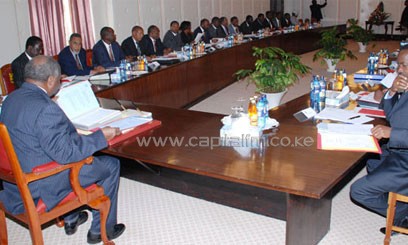
The law aims to eliminate the influence of financial resources in the outcome of Kenya’s electoral processes/FILE
NAIROBI, Kenya Nov 8 – The Cabinet has approved the Campaign Finance Bill, 2012, which will regulate the amount and sources of funds to be used during elections and referenda.
The law aims to eliminate the influence of financial resources in the outcome of Kenya’s electoral processes.
The Bill is the last election related legislation that Parliament has to enact in preparation for March 4, 2013 election as it creates a level playing field for candidates for political office and their political parties by regulating the sources of funding and setting spending limits.
It is expected to encouraging the development of issue-based politics.
Constitutional Affairs Minister Eugene Wamalwa said the law will be prioritised in Parliament when it resumes in two weeks, and will only sit for 55 days before its term ends on January 15.
The Cabinet meeting which was chaired by President Mwai Kibaki threw its weight behind the Bill which bars contributions into campaign kitties from foreign governments and entities, anonymous contributions, contributions from illegal sources and those from the State, its institutions or public sources.
It provides for the disclosure and documentation of source of funds for political parties and provides for offences that may arise from financing of campaigns.
The Bill provides punitive penalties for offenders which include the disqualification of candidates or political parties from contesting an election.
The Independent Electoral and Boundaries Commission (IEBC) will set spending limits for election campaigns once the Campaign Financing Bill is passed.
According to the Bill, the limits will be informed by factors such as the difference in the geographical size of the electoral area, the type of election, the population in the electoral area, the number of party members in the electoral area, and the communication infrastructure in the electoral area.
The IEBC will also publish the limit of contributions or loans that a candidate, a political party or a referendum committee may receive, limit of that a candidate, a political party or a referendum committee may receive and the limit for media coverage.
Candidates and parties who exceed the prescribed spending limit prescribed without justification risk disqualification from contesting in that election; or if the case is discovered later, they risk being banned from participating in the next the election.
The IEBC will alternatively impose a fine of an amount equivalent to the amount exceeded in expenditure during the campaigns.
Political parties shall be required to submit Party Campaign Expenditure Rules to the commission, at least three months before the nomination of its candidates.
Party candidates are to submit to their political parties and to the IEBC, a preliminary nomination expenditure report, within seven days of nomination and the final expenditure report within three months after elections.
Independent candidates will constitute their own spending committees and are required to submit expenditure reports within similar timelines as political party candidates.
The law on spending also compels political parties to submit their final expenditure reports to the commission within three months after the elections.
Expenditure reports submitted to the IEBC will have records showing all transactions; records showing all assets acquired and commitments entered into, a balance sheet, an income and expenditure statement, a cash flow statement and statements of audited accounts.
The Bill also requires political parties, their candidates and referendum committees- before an election- to fully disclose their sources of funding for purposes of elections or a referendum.
Political parties whose candidates are disqualified for failing to disclose information will suffer as they will not be allowed to field a replacement.
Aspiring candidates have already been banned from fundraising activities as the IEBC seeks to create a level playing field for all contenders.








































